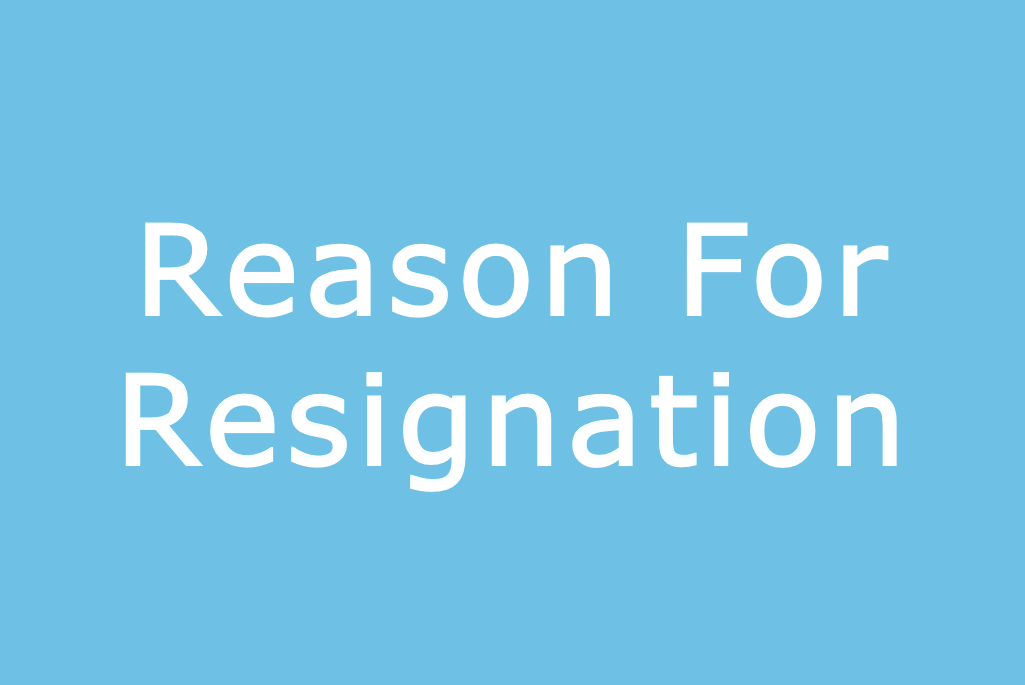“Reason for resignation” is the question that perplexes even some of the experienced professionals when they quit their job. Here we have summarized 5 types of reasons you can choose to use for your resignation. It is never easy to explain the sudden “parting ways” with long developed work relations with bosses and colleagues. Equally difficult is to keep details of the next job under wrap least something goes wrong. Hopefully these 5 categories will help you decide on what reason for resignation works best for you.
Reason for Resignation : Hard Reality – Why people actually leave
Someone had rightly said, “People leave their bosses”. That is obviously not always the case, but definitely it is one of most significant reason for resignation. Equally significant reason for resignation are lower compensation and lack of career growth within the organization. Many a times people leave because they feel under valued and the work is not challenging for them. Many also leave because of the work culture of organization or poor work-life balance.
Honesty here is not the best policy !
Can anyone mention these above “real” or “actual” reasons as the reason for resignation while quitting the job ?
If one is quitting the job because of – relocation or higher studies – in those case one can happily be honest and write the “actual” reason in resignation letter (or resignation email). But in other cases where one was unhappy inside the organization and decided to quit the job, one can’t write the actual reason for resignation. It is not that people are dishonest, its just that they don’t want to state the facts because it would be painful and hurt others and will perhaps lead to acrimony while parting ways. Everyone wants a professional parting ways in career and perhaps certain “hard facts” are better left unsaid.
The golden rule when resigning from any job is to leave on good terms (whenever possible) without burning the bridges. One never knows when you will come across your former supervisor or colleagues in world of work. You must remember that your ex-employer will be used as a reference by your future employers, hence it is always wise to leave as a “good employee”.
A “Good” Reason for Resignation : Must have these 3 elements
1. It should not “offend” anyone.
2. It should not make “rest of the team” feel as being inferior or envious
3. It should be easy to “justify” and “defend”
With this backdrop, we have listed here 5 types of Reasons for Resignation for you to consider.
First Category – Personal Reason
These are the easiest ones to state and justify. A resignation due to “personal reasons” does not offends anyone and does not generate any envy. These type of reasons are universally acceptable and allow an employee to gracefully leave the job. When writing resignation, you can simply mention “due to personal reason” as your reason for resignation. hen someone probes further, you can either opt to get into details alternatively if you do not want to share anything, you can simply stick to “personal” thing and not share more details. Though it might be frustrating for the other person, but still they will respect your decision and accept your resignation.
The best thing about this is that when you state “personal reasons” you are being completely honest and yet you are not allowing others to dig into your actual reason for resignation. You end up keeping your next move under the warp and if after few days people get to know that you have joined a competitor or a bigger brand in industry, they won’t call you a liar.
In case you are actually having a personal reason like – having health issues, or relocating to another state or deciding to retire or you are considering becoming stay at home parent – you should mention the exact personal reason and be honest about it.
Second Category – Taking a Break
To use this as reason for resignation, you need to have some solid underlying facts to support. And the break has to be long enough for others to accept your resignation and not ask you to instead take a 2-6 week long break and come back. You can take a break for multiple reasons including – taking care of new born child, old parents, family issues, deciding to work part time from home, long cherished desire to travel long distance and explore what you like.
Third Category – Moving to another job
Now this is probably the most direct and honest reason for resignation for people who are actually quitting for a better opportunity but then this is also the most trickiest of all. You need to handle this very tactfully otherwise you will end up offending your boss or colleagues or employer. First of all you need to ensure you do not criticize anyone – not your boss, nor the work culture, nor the poor compensation – you need to prepare yourself to answer for the next set of questions which everyone will be asking you as to what is “wrong” or “missing” in your current job. Remember not to talk about higher compensation or career growth opportunities etc., otherwise you will end up initiating an unpleasant discussion. You need to figure out how to handle those questions without being critical.
Fourth Category – Pursue higher studies
This is the easiest of all reason for resignation for anyone to use. Everyone might probably even congratulate you and give their best wishes for a more successful career after you complete your higher studies.
Fifth Category – Want to pursue something else
Now this reason also allows you to keep your future options open without actually disclosing them. But then you need to be prepared to answer the next set of questions on what do you want to pursue, why are you not happy in current job etc. etc. You can answer some of them vaguely and continue to keep things vague, without divulging what exactly is your next move.

Reason for Resignation : Do not commit these mistakes
- Don’t criticize your boss or express your unhappiness with work culture or any other employer policies etc.
- Don’t brag about your great new well paying opportunity to your co-workers
- Ideally do not disclose your next move. You would never know if any disgruntled boss or employer might decide to sabotage the move. Why take a risk ?
- Don’t talk about lower compensation at current job or lack of career advancement opportunities
Last important tip to help you decide your reason for resignation
Remember that in your next interview, you can expect the question why did you left your previous job. Your answer ideally should match what you wrote in your resignation letter (or resignation email). the reason is that your HR is likely to capture that as reason for resignation in the records and if your future employer goes for a verification of your past credentials then your past HR will share that reason with them. So avoid lying and getting caught.



